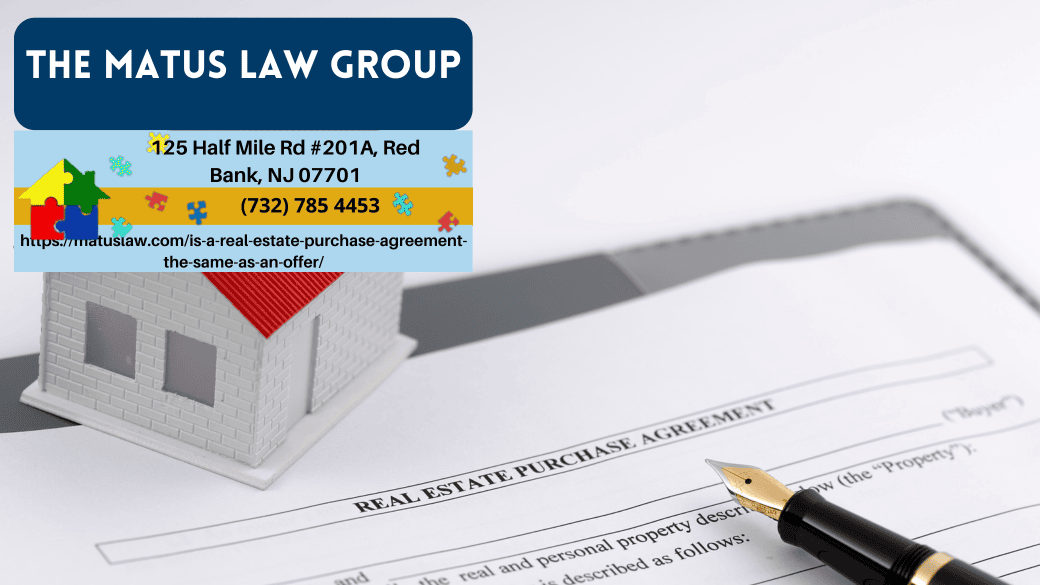After tirelessly searching for the perfect home, you’ve finally found it! The next step is making an offer on the property. However, it’s important to remember that legally binding offers on real estate must be submitted in writing, not verbally.
Before moving forward, it’s crucial to have your real estate purchase agreement carefully reviewed by an experienced New Jersey real estate lawyer. This is one of the most critical ways an attorney can help in buying a home, as it ensures the purchase agreement is comprehensive and serves your best interests. At The Matus Law Group, our team of New Jersey real estate attorneys may be able to help by reviewing your contract and guiding you through the entire home-buying process. Call us today at (732) 785-4453 and learn more about how we can help you.
What Information Must a New Jersey Real Estate Offer Include?
Your real estate offer will typically be drawn up by your real estate agent using the New Jersey Realtors® Standard Form of Real Estate Sales Contract. This standardized form is designed to serve as both your initial offer and, once accepted by the seller, your final, binding real estate purchase agreement.

The contract should include the terms of your offer, including the price you are offering, your deposit amount, a potential closing date, what things you would like conveyed with the home, and any other contingencies you would like included.
Essential Details Your Offer Must Include
The initial part of your contract will lay out the fundamental terms of your offer. These aren’t just suggestions; they’re vital for a valid and understandable agreement:
- Property Identification: This is more than just the street address. Your offer needs the full and precise street address of the property, including the city, state, and zip code. For legal clarity, the lot and block numbers are often included as well, which provides an exact legal description of the property.
- Parties Involved: The contract must clearly state the full legal names of both the prospective buyers and the sellers. Accuracy here is paramount for a legally binding agreement.
- Offer Price: This is the exact dollar amount you are proposing to pay for the property. It’s the core of your financial commitment.
- Deposit Amount: Your offer will specify the amount of the initial good-faith deposit you are providing. This money is held in an escrow account, showing your serious intent to purchase.
- Closing Date: You’ll propose an anticipated date for the closing. This is when ownership of the property officially transfers from the seller to you, and all financial transactions are finalized.
- Included Items: To avoid any misunderstandings, your offer should clearly list any personal property or fixtures you expect to be conveyed with the home. This commonly includes appliances like the refrigerator, stove, washer, and dryer, as well as window treatments and light fixtures. Being specific here is crucial and can prevent disputes later on.
New Jersey Real Estate Lawyers

Christine Matus
Christine Matus is a veteran New Jersey attorney with a passion for community service and real estate law. As the founder of The Matus Law Group, she leverages over two decades of experience to serve clients with integrity and care.
- Admitted to practice in NJ and U.S. District Court since 1995
- Trustee Secretary, Ocean County Bar Association
- Frequent speaker on estate planning and real estate topics
- Pro bono counsel to several nonprofits and community groups
- Legal advisor to Filipino-American medical and nursing associations

Kristine Carranceja-Gurski
Kristine Carranceja-Gurski blends her background in financial services with compassionate legal advocacy. She supports families with estate and real estate matters and champions pro bono service across the state.
- Licensed in New Jersey and New York
- Graduate of Loyola University College of Law
- Former Pro Bono Committee Chair, Ocean County Bar
- Speaker on legal access and expungement reform
Dedicated to nonprofit leadership and community service

Brayndi Grassi
A Toms River native, Brayndi Grassi brings local insight and a creative legal mind to her real estate practice. She transitioned from a career in intellectual property to focus exclusively on property law.
- J.D., New York Law School; B.A., NYU
- Licensed in NJ and NY
- Published scholar in copyright law
- Strong community ties with a passion for advocacy
- Enjoys music, vinyl collecting, and local engagement
What Must The Purchase Agreement Also Include?
Once the seller accepts your offer, it becomes your purchase agreement, and you have three business days to allow your New Jersey real estate attorney time to review its terms. During this time, either party can cancel the contract.
In addition to the terms of the offer, every real estate purchase agreement should also include:
- Your financing contingency: If you are getting mortgage financing, you want your contract tied to your ability to get the appropriate financing. If you are applying for a VA or FHA loan, you can specify the loan amount, a maximum interest rate, and the loan term you are willing to accept. If your financing doesn’t come through at these terms, you will be under no additional obligation under the purchase agreement.
- Closing costs and other expenses: Your purchase agreement should set out whether the seller has agreed to pay certain closing costs. It may also specify who will pay for things such as recording fees, transfer tax, escrow fees, title search costs, and title insurance.
- Home inspection contingency: If a home inspection detects significant flaws in the home, you can avoid the purchase altogether or negotiate the price accordingly.
- Sale of your own home contingency: If you are relying on the sale of your existing home for this purchase, this contingency makes the contract dependent on the successful sale of your existing property.
- Closing date: You should set out the potential closing date. This is typically 30 to 60 days from the signing of the purchase agreement, depending on your circumstances.
Once all financing and other contingencies are satisfied and any title issues are cleared, your closing will be scheduled. In attendance will be the closing agent, you, the seller, and your respective attorneys. Here, all documents will be executed, closing costs paid, the deed will be signed and recorded, and you will get possession of your new home.
Buying a new home is a large and expensive undertaking. Executing a legal contract for purchase should never be done without careful consideration. Having the advice and guidance of an experienced New Jersey real estate lawyer ensures that your purchase agreement is comprehensive and all its terms are in your best interest. At Matus Law Group, we can review your contract and guide you through your entire home-buying experience. Contact us to learn more.
| Inclusions in a Real Estate Purchase Agreement | Description |
|---|---|
| Financing Contingency | Specifies that the contract is dependent on the buyer’s ability to secure appropriate financing. It may also include the maximum payment the buyer is willing to accept. If financing is not obtained, the buyer is not obligated to proceed with the purchase. |
| Closing Costs and Other Expenses | States whether the seller has agreed to pay certain closing costs. It may also outline the responsibilities for expenses such as recording fees, transfer tax, escrow fees, title search costs, and title insurance. |
| Home Inspection Contingency | Allows the buyer to opt-out of the purchase or negotiate the price if significant flaws are discovered during the home inspection process. |
| Sale of Your Own Home Contingency | Makes the purchase contingent upon the sale of the buyer’s existing home. |
Understanding the Appraisal Contingency in New Jersey Purchase Agreements
When you make an offer on a home, the appraisal contingency is a crucial part of your purchase agreement. It’s a provision that gives you a safety net. If the property is appraised for less than your offer price, this contingency allows you to renegotiate with the seller or walk away from the deal without losing your deposit. This is your financial protection against paying more for a house than it’s worth. New Jersey law doesn’t have a specific statute for appraisal contingencies, but they are a standard and highly recommended part of real estate contracts.
You might be tempted to waive the appraisal contingency to make your offer more attractive, but this can be risky. An alternative is an appraisal gap clause, where you agree to pay the difference between the appraised value and the purchase price, up to a certain amount. This can show the seller you are serious while still offering you some protection.
If the appraisal comes in low, you have several options. You can try to negotiate a lower price with the seller, you can pay the difference in cash, or you can challenge the appraisal. If you have an appraisal contingency and can’t reach an agreement with the seller, you can cancel the contract. A real estate attorney can help you understand your options and negotiate the best possible outcome for you.
What is a Tie-In Agreement in Real Estate?
A tie-in agreement in real estate, often referred to as a tying arrangement, is a scenario where a seller conditions the sale of one property on the purchase of an additional product or service. This practice effectively forces the buyer to acquire something extra they may not have initially wanted, just to obtain the primary property of interest.
In real estate, a tie-in agreement involves two distinct products or services, with the sale being conditional. For example, a real estate agent might only agree to sell a property if the buyer also uses their firm for listing services. Alternatively, a broker might only sell a house to a customer who agrees to buy another piece of property as part of the deal.
These arrangements are not merely frowned upon; they are illegal because they undermine the principles of a free and competitive market. They restrict consumer choice and create an unfair advantage by only allowing those who can afford the additional tied product to proceed with the transaction. This goes against the ethos of fair housing and the free market.
Tie-in agreements are considered illegal when they meet certain criteria:
- The seller has a significant market power over the tying product
- The tied sale has a negative impact on the competition
- The buyer has no alternative but to purchase the tied product to access the first.
Such arrangements violate federal antitrust laws, which include the Sherman Antitrust Act, the Clayton Act, and the Federal Trade Commission Act. These laws were established to prevent monopolistic business practices and promote fair competition, with the Clayton Act specifically addressing tie-in agreements among other unfair practices.
Penalties for these illegal agreements are severe. Individuals may face fines of up to $1 million and up to 10 years in prison, while companies may incur fines as high as $100 million. These strict consequences underscore the importance of adhering to antitrust laws and maintaining fair practices in the real estate industry.
How Can a New Jersey Real Estate Lawyer Help
Differentiating between a purchase agreement and an offer is crucial for both buyers and sellers to ensure a smooth transaction. Familiarity with the nuances of the real estate process allows parties to avoid misunderstandings, protect their interests, and facilitate a successful property transfer.
To ensure that your real estate transaction proceeds smoothly and that all legal aspects are addressed, it’s critical to seek the legal help of a skilled New Jersey real estate lawyer. At The Matus Law Group, our team of New Jersey real estate attorneys may be able to provide invaluable assistance in reviewing and drafting purchase agreements, as well as ensuring that all parties are fully aware of their rights and obligations. Contact us today at (732) 785-4453 to schedule a consultation.



